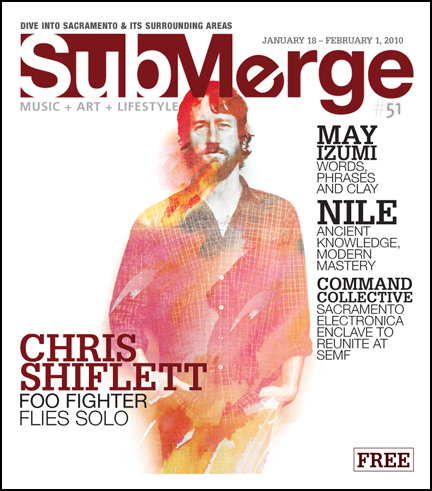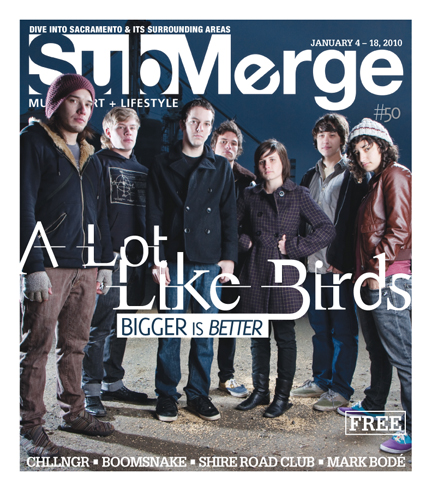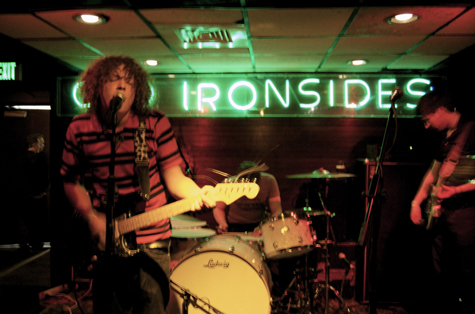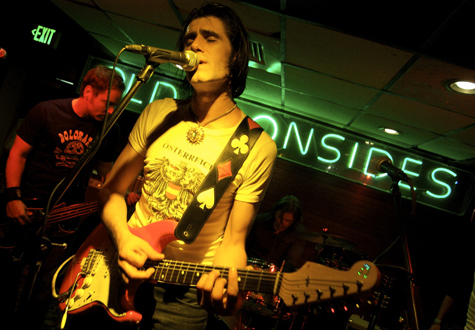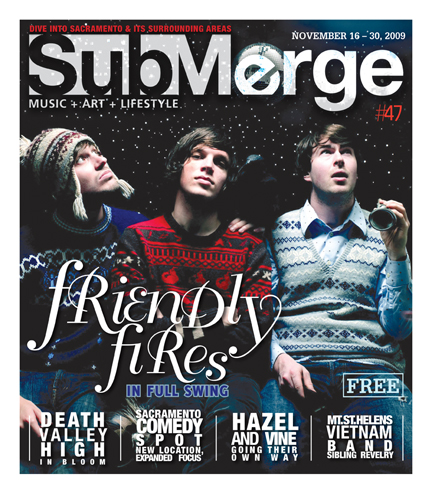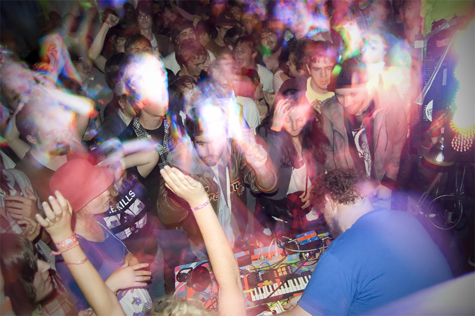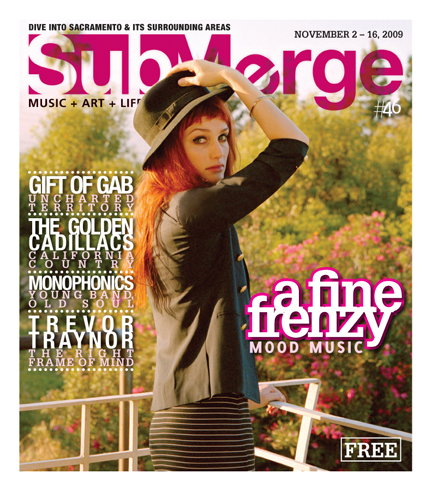 A comedy club might seem like an unlikely place to hold a hip-hop concert, but that isn’t stopping Aaris Schroeder (founder of UBO Mag) and her crew from throwing what is arguably one of the best hip-hop shows this fall at Laughs Unlimited in Old Sacramento on Thursday, Nov. 18. San Francisco-based MC Equipto from the group Bored Stiff, who is also known for his work with Andre Nickatina, will headline the show and with him will be members of his label’s crew (Solidarity Records), including P.W. Esquire, TabbDoe and B-Line. Also performing will be Z-Man from One Block Radius, and if you’ve ever seen him spit live, you know he’s the real deal. Another musical treat that night will be Michael Marshall, lead singer of the ‘80s R&B/funk band Timex Social Club. Marshall is probably best known for singing the hook on the timeless track “I Got 5 on It” from the rap group Luniz. Local heavy-hitters The Cuf and DJ Kool Kuts are also on the bill, further solidifying the dope-ness of the lineup. Hosting the event will be Big Sta The Legacy, an artist originally from Oakland who now resides in Sacramento. The show is 18-and-over and is only $10 at the door. Music starts at 10 p.m.
A comedy club might seem like an unlikely place to hold a hip-hop concert, but that isn’t stopping Aaris Schroeder (founder of UBO Mag) and her crew from throwing what is arguably one of the best hip-hop shows this fall at Laughs Unlimited in Old Sacramento on Thursday, Nov. 18. San Francisco-based MC Equipto from the group Bored Stiff, who is also known for his work with Andre Nickatina, will headline the show and with him will be members of his label’s crew (Solidarity Records), including P.W. Esquire, TabbDoe and B-Line. Also performing will be Z-Man from One Block Radius, and if you’ve ever seen him spit live, you know he’s the real deal. Another musical treat that night will be Michael Marshall, lead singer of the ‘80s R&B/funk band Timex Social Club. Marshall is probably best known for singing the hook on the timeless track “I Got 5 on It” from the rap group Luniz. Local heavy-hitters The Cuf and DJ Kool Kuts are also on the bill, further solidifying the dope-ness of the lineup. Hosting the event will be Big Sta The Legacy, an artist originally from Oakland who now resides in Sacramento. The show is 18-and-over and is only $10 at the door. Music starts at 10 p.m.
Tag Archives: Sacramento show
San Francisco-Based MC Equipto and Tons of Good Openers: Thursday, Nov. 18, 2010
The Batusis feat. Sylvain Sylvain of the New York Dolls and Cheetah Chrome of Dead Boys will perform at the Blue Lamp!
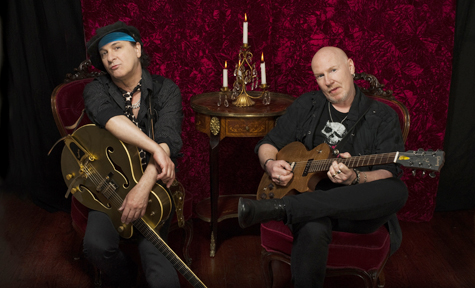
Calling The Batusis a “punk rock supergroup” seems cliché, but it’s accurate. Sylvain Sylvain is the wildly charismatic New York Dolls guitarist and Cheetah Chrome has wielded the axe for Cleveland icons Rocket From the Tombs and Dead Boys. Both of these guys have heavily influenced the direction of punk rock throughout their lengthy careers, but this is the first-ever collaboration between the two longtime friends. In Batusis, the two share guitar duties and take turns on lead vocals. Their self-titled EP, released by Smog Veil Records, is four tracks of loud, brash and fun punk rock, just the way they like it. On the EP Chrome and Sylvain are backed by the rhythm section of Joan Jett’s band, The Blackhearts, but when they hit Sacramento on Oct. 23, 2010 at the Blue Lamp the two will have Lez Warner of The Cult on drums and Sean Koos (who also lends his abilities to The Blackhearts) on bass. Opening this epic night as local punk heroes The Secretions, further solidifying that this is a must-see show. Tickets are $10 in advance and $12 at the door.

Alive and Kicking
Helmet, Bison B.C., Will Haven
Harlow’s – Sacramento, Calif. – Wednesday, Sept. 8, 2010
Words by Bobby S. Gulshan
As promised on the flyer, Grady Avenell has indeed returned to vocals, and the local faithful flocked to Harlow’s for Will Haven. Some call it metalcore, or post-hardcore, but Will Haven’s particular brand of bombast proves too elusive for quick categorization. Opening with “I‘ve Seen My Fate,” the dual guitar attack combined with keyboard atmospheres and driving rhythmic breakdowns conspired to create a steady sonic barrage. Avenell’s searing screams hammered the point deeper. With his back often to the audience, Avenell and the rest of Will Haven tore through their set with high-energy physicality, head banging in lockstep with one another. Songs such as “Helena” and “Carpe Diem” displayed the straightforward appeal of Will Haven’s approach.


Their music relies on power and heaviness coupled with a driving rhythmic intensity. Tonally, the riffs were almost monochromatic, with guitarist Jeff Irwin providing occasional hints of color with high-pitched staccato runs. Closing with “Stick up Kid,“ the band displayed its full physical force, finishing up a blistering set of six songs that left the hometown crowd hungry for more.

Hailing from the Great White North, Bison B.C. took the stage in the second slot. On tour with Helmet in support of their new LP, Dark Ages, the Canadian metal outfit added classic thrash-style riffs to a night of hardcore punishment. The guys themselves look like modern primitives, as if they wandered out of the same deep forest as the mythical Wendigo, which they reference in one of their more epic tunes. James Farwell and Dan And provide guitars and vocals, one singing with a characteristic death metal growl, and the other providing a cleaner vocal on more melodic sections. As drummer Brad McKinnon told me after the show, “When I first heard Dio all those years ago, it hit a place, and it’s been metal ever since.” Indeed. Bison B.C. fills their sonic space with complex riffs and blistering solos, as well as hardcore breakdowns. “Slow Hand of Death” displayed Bison’s ability to combine thrashing riffs with off-kilter time signatures, moving seamlessly into a galloping melodic section, and then returning to churning extended breakdowns. “Wendigo Pt.1” featured both guitarists locked in harmonies that evoked one part Slayer, one part Iron Maiden. However, the development of the songs–particularly the ability to transition from a blast beat to an extended break with ease–is signature Bison. The Harlow’s audience seemed a bit unprepared for this metal onslaught, but showed their appreciation nonetheless.
Turning 50 doesn’t seem to have slowed Page Hamilton. By the time Helmet took the stage, Harlow’s was packed and surging, and the seemingly ageless Hamilton did not disappoint. He told the audience that he was supposed to be on a juice diet, and then promptly took a swig from his Corona. Hamilton played to the audience, constantly engaging them with wit and charm. At one point between songs, Hamilton brought up the subject of football, taking a quick shot at the Pittsburgh Steelers by pointing out that “their quarterback is a rapist.”
Helmet’s classic album Meantime was released in 1992. While new tunes still bear the signature of Hamilton’s “glory days,” nothing sounds dated. Helmet has mastered extended breakdowns, utilizing various downtuned and detuned setups to create deep, heavy tones. The almost mechanical rhythms are persistent and stark, while the start-and-stop nature of the riffs keep bodies moving with an internal groove. Hamilton’s clear vocal melodies are somewhat refreshing in an age where the growl has become the lingua franca of hardcore and metal. Yet the riffs and breakdowns are as hard as anything out there. Old tracks like “Ironhead” and “Role Model” blended perfectly with new material, like the title track of the new album, “Seeing Eye Dog” and “So Long.” The show, of course, would not be complete without a performance of “Unsung,” which jolted the crowd into a frenzied sing-along with Hamilton. The back and forth with the audience continued during the encore when Hamilton asked the audience to pick three songs. “Black Top,” “In the Meantime” and “I Know” finished off the show, as requested by the fans. For a band that hasn’t toured in some time, Helmet and Hamilton have not lost a step, and all indications point to a long and hard-hitting future for the hardcore legend.
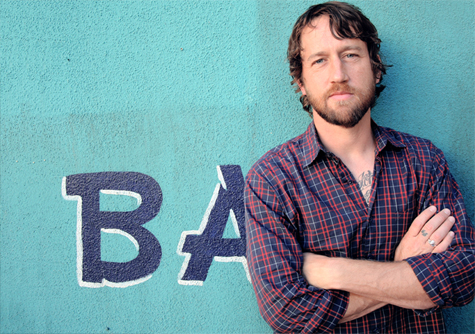
On to the Next
Chris Shiflett puts his time off from Foo Fighters to Good Use
Over the past decade, the Foo Fighters have risen to become one of the most prominent bands in rock ‘n’ roll, and guitarist Chris Shiflett has been a big part of that. Becoming a full-fledged Foo right before the end of the last millennium, Shiflett already had quite a resume as guitarist for No Use for a Name and also a member of Fat Mike’s punk rock cover band Me First and the Gimme Gimmes. In September 2008, Foo frontman Dave Grohl announced that his group would be taking an extended hiatus, a statement that has held true despite the release of a greatest hits comp at the end of 2009. The announcement didn’t seem to rattle Shiflett all that much. He just kept doing what he’s done the better part of his life: create music.
When Submerge spoke with Shiflett, he was just wrapping up recording for a new record he hopes to be finished tracking shortly. In the past, Shiflett has spent his time away from the Foo Fighters fronting another rock band called Jackson United, but the music he’s working on now will appear on a solo effort—well, sort of.
“I’m working on kind of a solo record, though it’s kind of silly to call it a solo record, because I’ve got a lot of other people playing on it,” Shiflett says. “It’s a solo record with a lot of my friends.”
Shiflett has no shortage of talented friends. One such friend is his old NUFAN cohort Tony Sly, with whom Shiflett will be touring the Western United States in February. Shiflett says that a show the two played together last year in Santa Barbara served as an impetus for the tour.
“We both have kids and wives, and we don’t really get to see each other so much anymore,” Shiflett says of reuniting with Sly on stage. “It was so much fun. We did a song together, and afterwards, we were hanging out, and we were like, ‘We should do a tour.’ So we started talking about it, and it just kind of came together. He’s actually got an album coming out in a week or so, I think. He’ll have product; I won’t.”
Shiflett may not have anything to hawk at his upcoming shows, but he will be trying out some of his new material. A departure from what his fans may expect, Shiflett’s solo record will feature “roots-y leanings.”
“It’s got more acoustic bass and keyboards and pedal steel and more instrumentation on it,” he explains. “It’s definitely not as rock ‘n’ roll as the Jackson United stuff, but it’s still me, and it’s still my songs, so I’m sure there’s a common thread there.”
It may sound like a serious downshift—both in sound and scope—from what Shiflett is used to, and it is. But it’s a challenge he seems pretty excited about. He says “it’s a trip” to go out on the road, on his own, to play a bunch of songs that many people may not have heard, but he acknowledges there’s also a certain amount of freedom involved as well.
“I like going out and doing the acoustic shows, because it’s so easy,” Shiflett says. “You just throw your acoustic guitar in your car, and there’s no corralling a bunch of people. It’s just fun. You kind of sink or swim on your own strengths and weaknesses. There’s nowhere to hide, which makes it pretty exciting to do that.”
In addition to playing new material, Shiflett says he will also throw some Jackson United songs and a few covers into the mix. And don’t be surprised if Shiflett and Sly play a song or two together.
How has it been playing music with Tony again? Do you revisit old stuff, or are you looking to do something new together?
It’s funny, because the song we ended up playing together, I just kind of surprised him. I said, “Hey, do you want to do that ‘Moonshiner’ song?” He used to bring an acoustic guitar on tour, so when we’d be on a long drive in a van, he’d play guitar and sing songs. It was a song that he used to sing. It’s an Uncle Tupelo version of some old standard. So I was like, “Do you want to sing that song with me?” and he came up and did it, so that took me right back to being in a van in the middle of nowhere with those guys. Me and Tony have known each other for a long time now, and he’s one of those guys that even if I don’t see him for a couple years, it just takes a few minutes”¦
You’re like fast friends all over again”¦
Yeah, he’s just a good, old friend of mine. We have a lot of love for each other.
Will he make a guest appearance on your own album?
You know that’s not a bad idea [laughs]. We haven’t talked about it, but maybe I’ll corral him into the studio when I have him down here.
You’ve played in bands like No Use for a Name and Foo Fighters, which are both on the louder side of rock music. Is the stuff you’re doing now something you’ve always had a penchant for?
Without a doubt. Of course I love loud rock ‘n’ roll music. That will always be my first love, but ever since I was a little kid, I was listening to Elvis and Johnny Cash and a little later on, I dug back into that older stuff—Willie Nelson and things like that. It’s always something I’ve been into and have had an appreciation for. It’s nice to take a break from screaming loud music and do something a little mellower. That’s the fun thing about doing these acoustic shows. I do some of the Jackson United songs, and they’re sort of a little closer to the way they sounded when I made them up in my bedroom, just sitting there strumming on an acoustic guitar.
Before you said you enjoyed just hopping in the car with your guitar and just going to a gig. Spending about 10 years with the Foo Fighters, and they’re a huge rock band, I’m sure that’s a lot of people and a lot of equipment. Is it refreshing for you to get on the road and do your own thing and not have to worry about all that?
Yeah, it’s just an easy thing. You just jump in your car, and it’s like a road trip with a couple of your friends. Touring with a band is great. Especially with the Foo Fighters, I’m not the one corralling people. We’ve got a guy that we pay to do that.
[Laughs] A corraller?
Yeah, we have a professional corraller [laughs]. It’s not very labor intensive for me, personally, but it’s still like a 50-person, 50-headed monster sort of thing. There is a kind of solitude in just getting out in your car and driving. The first show is in Seattle, so I’ll be driving all the way up to Seattle and then just heading down the coast. It’ll be nice. I’d like to say it’s a return to what it was like when I was younger, but I never really did this when I was younger. When I was driving to a gig in the car, that was like in the ’80s or early ’90s, and it was louder then.
Has this stripped down approach played into going into a more roots-y feel with your music?
Without a doubt. And that’s one of the things that I’ve really tried to do with this record that I’m recording—keep it sparse. When you’re doing a rock record, there’s a lot of doubling of everything, and all of a sudden, you’ve got 18 guitar tracks, and it’s become this unruly beast. I’ve really been trying to pare it down. Playing acoustic, it really makes you commit to parts. You really have to keep it simple—or at least I have to keep it simple, because I can’t go up there and play something really complicated and sing. It boils it down to the root of what the song is. I think it’s good for your songwriting.
Before you said that when you took the songs into the studio, they began changing. How did they change, keeping in mind that you said you were trying to keep them simple? Was there a conflict between the songs growing and your intent to keep them low-key?
For me, until I go in and actually record a song, I don’t commit to things until then. I don’t really work out the vocal melody exactly the way I want it to be until I get into the studio, and then you can’t hide from it. You can sort of hide live, you can fake it a little bit live, but when you get into the studio, you can’t fake it any more. That’s when you have to start making decisions.
You’ve been busy since the Foo Fighters went on hiatus. When the hiatus was announced, was that a welcome thing for you?
For sure. I think everyone was ready to take a break. We’d been pretty strong for a few years in a row without any real time off between records and tours and stuff. I didn’t think—I don’t know if anyone really thought—I sort of didn’t really believe that we’d take a hiatus. We sort of said that before, and then a couple months goes by and things start popping up, but we really have. Right now, there’s no real plan for anything, and I can’t imagine that we’re even going to start working on a new record until later into the year, because Dave’s doing the [Them Crooked] Vultures, and they’re going to be going for a while. It’s going to turn into a big, long break. “¦ It’s always good when we go out and do other things, that way when we go back to doing Foo Fighters, it’s fresh and everyone’s excited to do it. We’ve all got kids and stuff now, and I know for me, this last year being home has been unbelievable—just to be home with my kids. That’s one of the biggest upsides of doing what I do for a living. I don’t have to go to an office every day; I get to watch my kids grow up a lot. It’s been good. It’s been a healthy thing.
Chris Shiflett and Tony Sly will play The Boardwalk in Orangevale on Feb. 9.
Orchestrated Chaos
Sacramento music wunderkind Michael Franzino talks A Lot Like Birds
Words by Julie De La Torre
Photo by Daniel Dare
[audio:02 Hallows or Horcruxes_.mp3]
A Lot Like Birds isn’t, well, a lot like anything else you’ve heard before. Starting out as a two-man project led by frontman Michael Franzino, the experimental group soon picked up five additional members and hasn’t looked back. Since winning the Jammies with former band She’s a Dead Man in 2007, the precocious 20-year-old has not only grown up mentally, but musically, as well.
Submerge had the chance to chat with Franzino about everything from his main sources of inspiration to what it was like recording an insanely sophisticated debut release in the confines of a suburban living room. With their ball-busting stage presence and new full-length album, Plan B, A Lot Like Birds is proving to be one of the most promising up-and-comers of 2010.
So, first off, what are you trying to accomplish with A Lot Like Birds that’s different from your other musical projects?
In my previous and first band, our appeal lied solely in our live shows, due to youthful inexperience and naiveté in musicianship and our wildly eccentric and strong stage presence. People came to our shows to dance or laugh at how silly we could be. A lot has changed in my life in the two years since the demise of She’s a Dead Man, and a hell of a lot has changed since the beginning of it four years ago, when the majority of that music was written. It’s kind of like being a senior laughing at your goofy freshman self in retrospect. I’d like to think (or hope, really) that A Lot Like Birds gives people something stimulating or moving to listen to, while we lose our fucking minds on stage night after night.
What were your biggest challenges while recording Plan B?
That would most definitely be the drum programming process, which took five of the nine total months in the studio with the great Jack O’Donnell’s Shattered Records. I basically had a big MIDI spreadsheet before me with every possible beat and every possible drum and cymbal where I had to dictate, as a guitarist, every single drum note and how hard it was to be hit. That, and we had all kinds of nail-biting computer troubles; Jack never expected to record songs with over 100 tracks.
What have you taken from this entire experience? What have you learned since your days of winning the Jammies in high school?
What I learned most from this experience was the recording process really, and how to utilize it as another dynamic in my music. There are all kinds of tricks [and] ways to change moods or make parts sound bigger or spacey or creepy. Utilizing effects and compression appropriately can really make a song or part something different. There’s so much more to making a record than people think; it gives me such a new love for the albums I revere.
It seems like the album has a lot of Mars Volta/At the Drive In inspiration behind it. If so, how does that come into play? What/who are your main influences?ÂÂ
Omar Rodriguez-Lopez is certainly a hero of mine. If I take anything from the man, it’s a driving insistence upon challenging myself and an audience. Using chaos and discord to contrast gentle and beautiful or making tension and anxiety in a big build are some of my favorite dynamics, and Omar is a master of them among many other things. If the music I write is influenced by anything I can articulate, it’s moods or phases in my life. The past few years in which Plan B formed in my head were some of the darkest times I’ve seen. I think you can hear it in comparison to my embarrassing former work.
What was it like to record with 10-plus musicians?
It’s absolutely amazing. I wouldn’t have it any other way; I like big compositions with all kinds of layers to tear apart and fall into. I’d be tragically bored in a typical three-piece rock band. The performances I witnessed in Jack’s studio were absolutely beautiful. Most of these guest musicians came in without hearing the music once and laid their parts down in one to two takes. I could not be more grateful to have such helpful and incredibly talented friends.
This album was very reminiscent of a rock opera—was that your intent?
It was not, but I had certainly hoped for the songs to flow well into each other and for it to be an album, not just a collection of songs. I think there is a difference; each song on the album is intentionally placed where it is.
Describe the live show of A Lot Like Birds… What do you think sets you guys apart from anyone else right now?
Our live show was an interesting entity to orchestrate, with the album consisting of so many musicians and all. Originally intended as guests on the album, Cory Lockwood, screamer; Ben Wiacek, guitarist [of post-hardcore project, Discovery of a Lifelong Error]; Athena Koumis, violinist [of folk-rock project, Life as Ghosts]; Juli Lydell, vocalist/keyboardist and Tyler Lydell, drummer [of experimental-folk project, The Dreaded Diamond] have all banded around myself and bassist Michael Litterfield. Making us seven strong, there’s rarely a time when you don’t have something to watch. We arrive to shows with every intent to walk off stage extremely sore, sweaty and out of breath.
What are your plans for 2010? Any ideas for a tour or additional albums?
We are going in to record an acoustic EP called Fuck Morrissey within the next two weeks and after that another full length, because if this took nine months to record, only God knows how long the next one will. As far as touring, we are most definitely going to tour at all costs this summer, hopefully with the backing of a label or management company, but DIY will suffice.
Any last words?
Yes, please listen to the bands whose musicians were guest on this album, including: The Dreaded Diamond, H. Letham, Life as Ghosts, Discovery of a Lifelong Error, Zuhg and our friends The Speed of Sound in Sea Water!
A Lot Like Birds headlined Jan. 16 at the Shire Road Club in Sacramento.
To find out when and where they’re playing next check out www.myspace.com/alotlikebirds
Thanks be to Rock ‘n’ Roll
Mike Farrell, Lite Brite
Old Ironsides “¢ Wednesday, Nov. 25, 2009
Words by Adam Aaake “¢ Photos by April Fredrikson
In our last issue, no. 47, local musician and show promoter Ira Skinner said that “Sacramento’s music scene is probably in the worst condition that I’ve seen it in my life.” Sadly, I’ll have to agree with that. But in the season of giving thanks and on the eve of our nation’s holiday, I was thankful for the bands that are continuing to kick ass year after year, night after night.
A crowd of over a hundred gathered inside the warm walls of a familiar Sacramento venue that happens to be celebrating its 75th year of operation—Old Ironsides. Jerry Perry, another icon of our local scene and the man responsible for the majority of the booking at Old Ironsides for the past who knows how many years, has put together an all-star series of shows featuring the best acts our city has to offer. Last Wednesday’s bill began with a block party set from the always entertaining Lite Brite. Imagine Buzz Osborne with a voice like Howlin’ Pelle Almqvist, a drummer from the school of Tom Bonham and a bass player with a warm and fuzzy Rickenbacker; throw in a solid lead guitar player and you’re close to their sound. Their opening song, “Space Shuttle” lifted the crowd from their seats and had them orbiting around the stage like well lubricated satellites. Singer Eddie Underwood was belting lyrics through his thick, dirty-blond hair that sprawled across the front of his face, flailing his arm to the ceiling and arching his body forward as a he played an arpeggiated guitar riff with his free hand. An exhibitionist? Maybe. Pretty bad ass? Definitely.
Their fourth song in was ghostly reminiscent of Far circa Tin Cans With Strings to You. What added to this poltergeist was Far bass player Johnny Guttenberg looking on from the side of the stage. Later he would play with Jackpot, who was also on the bill that night, so I guess it wasn’t too strange. It’s great to hear and see the influence that a great Sacramento band like Far continues to have on the current scene.
A skinny-framed man with a tight fitting white T-shirt and a thick head of greasy brown hair that was slicked back over his head approached the stage. He slowly picked up his guitar and slid it over his shoulder in a routine manner, adjusting the leather strap that was decorated with the suits of a deck of cards. A dense crowd was surrounding the stage at this point and it was clear that they were here to see the next act. His name was Mike Farrell and he needed no introduction. The second his guitar was strummed and the set began, the experience and tenacity of Sacramento’s guitar legend proved true once again. This time with his own band, Farrell played a set of grimy rock ‘n’ roll tunes that were layered with keys and violin from the talented multi-instrumentalist Liani Moore. Veteran drummer Mike Curry did his thing on the skins while keeping the back end pocket with bass player Shawn Hali.
This performance was all about Farrell, though. When he solos you listen; touching every part of the guitar and producing sounds from his instrument that seem otherworldly. He raised his hand over the guitar as it hummed, controlling it like a shaman—he owns its soul. His mouth pursed, and he stepped to the microphone and muttered his lyrics, more concerned with the noise of his chord that continued to linger.
His music is a rare fixture of the scene that we as the local fans have the pleasure of seeing, and that, my friends, is what I am thankful for. I am thankful for the huge crowd that gathered on a brisk Wednesday to support a bill of favorites and a venue that has housed the sounds of thousands of bands over the course of its live music lineage.
Tonight, Ira would be proud.
Fires in Brazil
Friendly Fires start a burning groove with Samba and”¦R&B?
Friendly Fires are tapping into an energy that has turned entire cities into dance floors. The samba rhythms of Brazil have long been important to music culture, most notably having a monumental influence on jazz. But the boys from St. Albans, United Kingdom, aren’t hangin’ with the “Girl from Ipanema.” Friendly Fires have borrowed from this rich genre of music and have crafted a sound that is at first pop music with an electro edge but when explored exhibits complex polyrhythms and well thought out lyricism. A song like their new single “Kiss of Life” is a prime example of their efforts in full swing.
“On ‘Kiss of Life’ we based it around that kind of rhythm and a couple of samples,” says drummer Jack Savidge. “We got the feedback guitar and the samba group in to play with us. We kind of pushed it.”
The Mercury Prize nominated band released a few singles independently, including their hit “Paris” before they were signed to XL Recordings in 2008. Since becoming label mates with bands like Radiohead and The White Stripes, the pace has picked up a bit and a full-length, self-titled debut featuring the critically acclaimed “Jump in the Pool” and “Skeleton Boy” followed shortly. With all the sudden attention, other nominations for various awards started to come their way, which the band took with a grain of salt after the significant but not devastating loss of the coveted Mercury Prize.
“It genuinely doesn’t really mean that much,” explains Savidge. “I mean, if we’d won the Mercury Prize it would be a big thing for us. A lot of the others, it genuinely isn’t a big thing.”
Currently on tour with the painfully hip The xx, Friendly Fires will be crossing the Atlantic to finish off an extensive tour here in the States. The last time they were here was 2008, supporting Lykke Li and only coming as close as The Independent in San Francisco. This time around, they’re the main attraction.
“I think it will be good. It’s our first proper headline tour in the United States,” says Savidge.
You can catch them live at Sacramento State on Nov. 24 inside the University Ballroom, where dancing will no doubt ensue. Submerge caught up with drummer Jack Savidge as the band was preparing to play a show they helped organize called The Warehouse Project in Manchester.
You guys are almost at a point where you think it’s not going to happen for you, you start off recording songs in a garage, you make limited edition pressings of your music and then all of a sudden you’re on tour with Crystal Castles and then Interpol and after that signed to XL and are now label mates with Radiohead! Has the past couple years been a little overwhelming?
When we were recording the songs in the garage, there was never any fearing that, oh no things aren’t going well. Because as a band starting out, it’s always amazing to have a record of your music. That’s always been amazing for us. So, it wasn’t really like, “Oh no,” we’re just doing this thing and then all of a sudden it was a whirlwind. It seems to have grown kind of gradually. It’s kept on growing and growing and we’ve been touring pretty much relentlessly for the last couple of years. So I guess now we’re seeing the fruits of that. It’s always strange as a music fan, going into HMV and seeing your CD there and to read magazines that you’ve read since you were a teenager and read about yourself. Or seeing a TV program that you videoed as a teenager religiously and then you’re on them. It’s weird. We’re all sort of music obsessive, nerdy types. You can get really blasé about it because it just becomes another thing in the day that you’re going to do. Say, playing a big show or playing a festival. You do kind of get a sense of, look how far we’ve come. We’re doing these things that I dreamed of doing.
I watched your hi-tech Flip behind the scenes footage on the Web site, and it looks like the three of you genuinely get along really well. Is the songwriting process as agreeable?
Yeah, generally. There’s the occasional disagreement, but I think there have been a couple things that have been slight sticking points. Obviously it’s not all white and rosy. But it’s quite easy to, if there is a disagreement, it’s quite easy to just have a deep breath and then get on with it. The mood never gets too dark, even though there are differences of opinion. That’s important for a working relationship. Everyone has their opinions, but I suppose we spend so much time together that it’s either get on well with each other or just have a horrible time all the time. I think we’d rather just get along well with each other.
There’s a lot of emphasis on percussion in your songs. The new single “Kiss of Life” is a Brazilian rhythm, which I know is big inspiration for you guys. What is the layering process like? Do you have a percussive groove that leads the idea or do all the bells and whistles come later?
I’d say, usually beforehand. We generally work on songs from the bottom up. We get something that sounds—some kind of drums and bass groove that sounds good. You know, the mapping out of it all. What might be the verse, what might be the chorus. We tend to add a lot from there. Because of how we write, which is generally ideas go straight into the computer and then we can layer things up like that, rather than if we were working everything out in the mode of a live band. But we’d only be able to imagine half as many songs as there are hands able to play them at one time. As we work on the computer there’s a lot of room to put down loads of percussion and make something sound like a really big rhythm section before vocals get even thought about. We try to do as much to an instrumental track as we can and then usually it leads the way to adding vocals on top. I think it’s kind of helpful to him [Ed MacFarlane, vocalist] to have a vibe there and the percussion definitely helps that. It’s always an atmosphere thing—the percussion. You can get the impression of a lot of energy by building up those layers. That informs the rest of the song.
What is it about the Brazilian samba that interests you so much?
It’s just really exciting sounding music, because it’s so percussive and so intricate. It’s always going to sound really exciting. I think there’s a theme to that. It almost found us by accident, because look at “Jump in the Pool”: almost by accident that had a slight kind of a samba feel. Although that was never what we were actually aiming for, it just ended up like that. I guess it found us. Actually the stuff we’ve been doing recently, there hasn’t been an awful lot of songs that sound very Samba or anything.
What’s the new stuff starting to sound like?
It’s pretty varied, actually. We always want it to be varied. There’s one song that sounds a bit like R. Kelly or something.
Like “Trapped in the Closet?”
No [laughs]. More like “Vibe”-era R. Kelly; like Dangerous-era Michael Jackson. The sort of”¦ Is it new jack swing? I guess it’s new jack swing.
That ’90s R&B sound?
Yeah, yeah. But a bit more upbeat. I guess the ’90s were on Timbaland and stuff, who pushed it a bit more sparse and a bit slower and a bit weirder. But yeah, I think we’re vibing off the early ’90s stuff. There’s some quite groovy ones using a lot of”¦vaguely afro-y. But I don’t want to say that because everyone will think we’re going all Vampire Weekend or something. Actually, we’ve got three ballads on the go. We’ve never really had a very slow—I guess “Strobe” is quite slow; we’ve never really had very slow, lighters in the air songs. So maybe there’ll be a few of those on the next album.
I think what sets you guys apart from similar bands is the content in the lyrics. They’re not these hollow songs with a catchy hook. They have the hook but there’s an emotional edge to each song. Are the lyrics strictly Ed MacFarlane’s or does everybody contribute to the lyrical content?
Ed generally does all the lyrics. But we’ve done a couple of things all together like “On Board” we wrote together. Bits of “Jump in the Pool,” the chorus was a group effort. But Ed generally does it. I think it’s fair enough, because he’s the one who sings it night after night. He may as well believe in it.
It seems as though all these awards have overshadowed you guys, particularly your loss of the Mercury Prize. You joke on your Web site about not losing much sleep over these things, but it has to mean something to you to be nominated. Does it matter really? Or are you already jaded by awards?
I think genuinely, not in a kind of snotty way, but we’re generally not that bothered really. The first few times you’re nominated for an award, it’s really exciting. You get to dress up in some smart clothes and then go and have dinner and spot loads of famous people. Get really drunk on the wine that endlessly turns up at your table. After you’ve done it, you’ve kind of done it. I think for us the Mercury Prize was pretty special, because it’s one of those things that you grow up hearing about and you’re interested in. I remember when I was a teenager there being all this hype about it and who’s going to win; who your money is on. It’s a big talking point. About the others—it’s really nice to be nominated.
Friendly Fires will played alongside The xx at the University Union Ballroom on the campus of Sacramento State on Nov. 24, 2009.
Youth Ain’t Wasted
Mt. St. Helens Vietnam Band has the heart of a teen, literally.
“We didn’t necessarily know what we were getting ourselves into,” explained Benjamin Verdoes, co-founder and lead singer of Seattle, Wash.-based Mt. St. Helens Vietnam Band. He talked over the group’s timeline as he waited patiently for wife and band mate Traci Eggleston to pick him up so they could head to the studio; there, they’d work out percussion kinks for the newest record. This has been Verdoes’ daily schedule as of late: work, then studio.
At this point, all the ideas have been born. The songs have all been written in full and are in the Mt. St. Helens repertoire. Verdoes has been anxious to get them recorded. Now they’re laying out a lot of basics, getting the skeleton of the album built so it can be out by early 2010. They’re progressing, but what’s left is “a lot of little details to fill in,” Benjamin said.
They might sound like old pros at this, but this is an incredibly young group. In fact, that’s essentially what Mt. St. Helens is known for: their youth, belonging in particular to their 14-year-old drummer (and Benjamin’s adopted younger brother), Marshall Verdoes.
“He kind of blows people’s minds every time they see him,” Benjamin said. “He doesn’t even necessarily look 14, and when people find out how old he is they’re genuinely awestruck.”
Mt. St. Helens actually started as just an idea between the Verdoes brothers. When Marshall was young (or younger”¦), Benjamin would bring him along to all the shows he attended, and Marshall would incessantly try to convince Benjamin that they should start a band together. Benjamin slowly started teaching him some tricks on percussion, and was impressed by Marshall’s quick knack for drums.
Benjamin had been involved in other various bands, but after watching his younger brother progress so fast and accurately on drums, he decided to experiment. The two began a project, roughly four years back, as a pair sparking fire for the first time.
“In some kind of form, in some rough primordial state, it was just us playing riffs,” Benjamin said.
It wasn’t until fall 2007 when the lineup became a quintet, including Matthew Dammer, Jared Price and Eggleston.
From the start, there was a lot of quick buzz surrounding the group’s odd approach to hyping their new creation. They made a Myspace page, but didn’t actually post any samples of their music, opting instead for comical blips and parodies that did not relate to their music whatsoever.
“We kind of, through this series of accidents, came up with this thing where we didn’t post music,” Benjamin explained.
The brothers hadn’t landed on a solid demo yet and were in transition from a two-piece into a larger group. Even if they were posting purely to stall for time as the group took form, it worked. Mt. St. Helens gained a ton of interest; enough that at their first show, there were hundreds of awaiting bodies.
“It was an interesting reaction that we got, so we definitely played into it,” Benjamin said.
Things continued to go well, enough so that Mt. St. Helens went from something of a fling to a full-fledged affair. Comparisons in sound were made with bands such as Wolf Parade and Modest Mouse, thanks in part to the driven scratch of Mt. St. Helens’ urgent guitar chords, swelled by slaps of cymbal and other smack percussive movements, exemplified prominently on songs such as “Albatross, Albatross, Albatross.” Impressive, catchy licks with Benjamin’s lightly fuzzed-yet-piercing vocals are displayed nicely on “Anchors Dropped.”
Mt. St. Helens spent the last year touring across country and playing from their self-titled album (which came out in mid-March), which consists of a lot of Benjamin’s older material, mostly songs quilted together with years of pieced ideas. They’ve also been debuting selections from their upcoming release.
Whenever they can find spare moments, be it on a long stretch of freeway in the van, or at pit stops or cafés, Benjamin and Eggleston take turns helping Marshall with his schoolwork. This wasn’t a choice based purely on touring. A few years back, Marshall realized it was much easier for him to get schooling done on his own, away from the traditional school scenario. Benjamin was already helping Marshall with his schoolwork, but volunteered to take on the role of teacher as well. Even off the road, Benjamin and wife Eggleston take turns helping Marshall with school while the other works a part-time job.
Between the commitment to the band, the family tie and the schooling, the Verdoes brothers are virtually inseparable. Luckily, they have a tight bond.
“I spend almost every waking hour with him it seems like, for the last four years,” Benjamin laughed.
For most kids, the kinds of distractions presented by being a traveling musician and still getting school work done would be too much; but the environment has worked well for Marshall, Benjamin said.
As far as the live shows themselves, it’s still a real treat for audiences to see a youth so precise and talented on drums.
“We work really hard on it, but he definitely has a real gift for it. It’s really cool to watch,” Bejamin said in praise of his younger sibling.
Benjamin still finds himself having to pull his brother’s I.D. out for proof of that he’s underage.
“People—they’ll argue with me, they’ll be like, ‘He’s not 14,'” he said.
For the time being, they’ll be touring through the West Coast and finishing up in the studio, still somewhat curious of their own next step.
“It’ll be definitely interesting how this next record comes out in the spring,” Benjamin said. “How we transition into this real, band, I guess.”
Deacon Around
Dan Deacon
Luigi’s Fungarden, Sacramento, California
Monday, Oct. 19, 2009
Words by Vincent Girimonte
Photos by Samantha Saturday
Dan Deacon’s set at Luigi’s Fungarden on Oct. 19 reminded me of that saying, “Angels can fly because they take themselves lightly.” Manifesting this was a state worker boogying next to some teenage princess probably 20 years his junior; and Deacon himself, pleading with us to imagine a “sky of hair” above the dance floor. Suffice to say nobody was caring.
The Baltimore-bred electronic artist owns one of the more egalitarian live spectacles you’ll come across, and it’s anything but gimmicky, despite the merch peddler performing interpretative dance (which was a little gimmicky). Dancing around isn’t compulsory, just highly encouraged. If that’s not enough to get you moving, peer pressure eventually kicks in to where anybody not sweating through his or her shirt may as well be the chaperone. The result was a Fungarden smelling “like a farm,” as one hooligan put it.
Deacon set up on the floor, caved in with lights, amps and a throng of impatient youths savagely bouncing around near his board, which looks like it was made on Sesame Street. This preferred dynamic may be his referendum on the typical live performance hierarchy (the artist being up there, and everybody else down here, having all the fun); or, perhaps being among his crowd he can more easily organize dance-offs and the ubiquitous “human tunnel”—each making an appearance at Luigi’s. There’s an element of wedding MC in Deacon’s shtick, the one that comes free with the venue and wants everyone to be happy while waiting for the buffet. Sometimes you need that guy.
I would hesitate to call Bromst, Deacon’s second full-length release and the primary source material for Monday’s set, “experimental” if he himself didn’t sometimes classify it as such. Admittedly, this is probably out of my own misinterpretation of the word “experimental,” as in you can’t shake your ass to it. Live, the tone is surging and rich, bringing to mind that “noise in tune” adage—but this is also pop music, implying some accessibility. Deacon plants playful, trippy melodies on the grinding rhythms and manic live-drum samples, and from there it just goes up and up at a breakneck tempo. It’s the music of frolicking optimists, and resonated well within the snug confines of the Fungarden.
He grabbed the mic every now and then for some cathartic chanting—not that he can sing, really, but nobody seemed to mind. By the end of the show he was Uncle Dan, commiserating with the Sacramento audience as a Baltimorean knowing what it’s like to live in a city consistently ignored by the hotshot indie tours. Though if this reputation is what brought Deacon here in the first place, it is one we can surely live with for a little while longer, at least until Uncle Dan returns.
Getting Into the Mood
Alison Sudol leads A Fine Frenzy quietly into the spotlight
Alison Sudol’s soft voice creaked from the ear of my phone, sounding positively under the weather.
“I got really, really sick,” says Sudol with a cough after I ask her how the nationwide tour she’s on has been going.
“A really weird cold knocked me out and I had to cancel a show, which is rough. But I’m better at least. Besides that, everything is great,” Sudol says optimistically.
She called from a hotel room in Hoboken, N.J., which is right outside of New York City, where the next evening Sudol and her four-piece band would be performing songs from their new album, Bomb in a Birdcage, the followup to their 2007 breakthrough album, One Cell in a Sea. Sudol is the voice behind the Los Angeles-based indie-folk outfit A Fine Frenzy. With a recent spot on The Late Late Show with Craig Ferguson and a video for the single “Blow Away” that made it to the top 20 countdown on VH1 along with rotation on MTVU, Sudol shows no signs of a sophomore slump. While writing Bomb in a Birdcage, she and the rest of the musicians let things happen naturally just as they had with their previous record. There was no calculated process; no planning of the next move.
“I don’t really know what’s going to happen next. I just know that every little step of the journey leads to a final product,” says Sudol.
A Fine Frenzy’s journey is a bit of a fairy tale. A Virgin Records executive came to her house, sat on her couch and listened to a showcase by Sudol and her band. A few weeks later they were working together. Not exactly the grueling path that most musicians take to get a record deal, but sometimes if you’re just that good, then it’s just that easy. At the age of 24, Sudol has already established herself as a remarkable singer/songwriter with the piano chops to match. Her playing is the perfect accompaniment to her soft voice that sounds marvelous in every part of her range, from the quiet whispers to her robust hooks that climb along the scales. Musically, she’s wise beyond her years and has probably taken a tip or two from artists like Rufus Wainwright and Brandi Carlile, with whom she’s already toured. Her songs are poignant and emotionally charged. Bloggers and critics use words like “whimsical” and “pixie” to describe Sudol, but she’s no Tinkerbell. On Bomb in a Birdcage, she and her band wanted to let their hair down a bit and show that they also have a raucous side. Even on tour, their sound continues to evolve with the addition of electric guitar, an instrument that has sparked a new fascination for Sudol.
“I played it yesterday for the first time,” she says with a hint of glee in her voice. “I didn’t want to put it down. It created a monster and now I’m obsessed. In a quiet way.”
Bomb in a Birdcage, which is still fresh in new release displays at record stores around the country, will quickly be accompanied by an even newer release of the seasonal variety. A Fine Frenzy will release Oh Blue Christmas on Nov. 3. This six-song EP will be available at Target and will feature songs from Charlie Brown’s Christmas as well as three originals that were written and rehearsed inside the Sudol’s house this past summer.
“We were writing at night and I would put the fire on and stuff. It wasn’t very summery,” says Sudol about the mood required to write Christmas songs in the summertime. “There was so much energy and because we were playing it all at once and the way it was going down, it felt like Christmas.”
Christmas comes early this year when A Fine Frenzy makes a stop here in Sacramento at The Boardwalk on Nov. 13. In the meantime, throw another log on the fire and snuggle up to A Fine Frenzy.
You just released your sophomore album Bomb in a Birdcage that’s been doing quite well. Did you ever imagine or was it ever a concern that your next album would equal if not surpass the first?
I think that as an artist and as a person, whatever you do at that moment you want it to be better than what you did before. You want to have learned from the whole process and you want to take all that knowledge and the growth that you’ve made”¦and make something better. It was different in a sense that I made the first one [One Cell in a Sea] essentially in a vacuum. The idea that people were going to hear it was a foreign concept. This time, knowing that people would hear it—people who had bought the first album—there was a likely chance that they would buy the second one just to check it out, even. Just knowing that there was a built-in audience and ears on it before it was even out.
But did you have the mentality that you had to gain the respect of new fans while still maintaining the respect of the old ones?
Oh, well of course! I mean you’ve got to put out something good. You can’t think too much on it and worry too much; it’s counterproductive. Because once you start getting into the realm of trying to please people—I don’t actually know what pleases people except for being honest in music and trying to make stuff that I like to hear. That’s really the only gauge that I can trust at the end of the day. I mean, you never know if people are going to respond to that or not. Hopefully, as long as one is putting out something that one believes in with a wholehearted effort you can’t really go wrong there, because at least you know at the end of the day that you did your best.
You’ve said yourself that you’ve stretched your wings quite a bit more on this record in terms of what you can do sonically. Looking back, do you think you stretched enough? Too much? Do you see your songwriting getting louder and more electric seeing as how you’ve already proven you can woo the crowd with the more tender songs?
Actually, no. I never know which way I’m going to go until it starts going there, you know? I actually want to be more folk-y in my next endeavor, and quieter again. For me, it’s sort of more like a pendulum. I’m really quiet for long enough, and then I want to be really loud. Then I’m really loud and I want to be quiet.
Was it difficult to get into the right mind frame of writing and recording Christmas songs when it was the dead of summer?
You know, you’d think so. There was no doubt about what season it was. It was summer. It was hot. My house has the ability to feel quite Christmas-y year round. I live in like a seven dwarfs cottage, pretty much.
You made an effort to set the mood?
Yeah, I mean it wasn’t really an effort for that particular thing. That’s just how I like to be.I’m sort of a Christmas-year-round kind of a girl. Once I started getting into writing Christmas songs, they just fit into each other. I wouldn’t say it’s easy, because it’s definitely hard to write a Christmas song that doesn’t turn into total cheeseville.
I feel like opinions on Christmas songs are quite polarized. Either people want to gag when they hear them or they become tremendously sentimental and can’t wait until December to play them. I think the Charlie Brown Christmas album is something we can all agree on; was that a conscious decision? Choosing those songs?
The three songs that I chose for this—that we chose, because we really discussed it a lot as a band—were “Blue Christmas,” “Winter Wonderland” and the Charlie Brown Christmas song [“Christmas Time is Here”]. Each of them didn’t feel like the typical Christmas song and yet really personified Christmas for all of us in their own way. The Charlie Brown Christmas song, the hardest thing on that really was that it was done perfectly. Perfect. So we were like, “Wait. How are we going to do this without messing it up? It’s kind of hard not to go downhill from there.” But our version is quite different. The whole album is very much its own thing. Somehow, I don’t know how it happened, but somehow “Blue Christmas” sounds cheerful and “Winter Wonderland” sounds creepy. We just tried to put our own spin on it and bring out something different in the songs and tried not to make them gag-worthy. In the other songs, we do use some Christmas tricks, and there are definitely sleigh bells on here, but we tried not to use the typical Christmas shtick unless we did it 100 percent and did it knowingly.
A Fine Frenzy will performed at The Boardwalk on Nov. 13. Oh Blue Christmas will be available exclusively at Target on Nov. 3.

